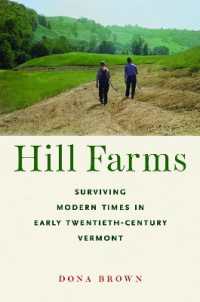Full Description
This book provides a lively, concise and definitive introduction to the study of the causes of crime. Authoritative yet accessible, it offers a guide to the historical development of criminology as an academic discipline and in doing so:
presents an overview of a range of different theories of crime, including classical, biological, psychological and sociological approaches
analyses the strengths and weaknesses of each theory discussed
provides chapter overview boxes and key summary points
helps you to take your studies further with self-study tasks and suggestions for further reading.
In covering key theoretical positions and placing them in their historical context, Criminological Theory in Context is perfect for students taking introductory courses in criminological theory.
Contents
Chapter 1: Studying Criminal Life
Crime and society: an introduction
Researching criminal life: the place of theories of crime
Chapter 2: Classical Criminology and Contemporary Rational Choice Theory
Introduction: the reasoning criminal and the social contract
Society, crime and punishment
Classical criminology and crime deterrence
Neoclassical criminology
Critiquing Classical/Neoclassical criminology: does deterrence work?
Contemporary rational choice theory
Situational crime prevention, opportunity theory and routine activity
Chapter 3: Biological Criminology
Introduction: Classicism, positivism and the development of Biological forms of criminology
Physiognomy and phrenology
Lombroso and atavism
Lombroso's heritage: in search of the criminal type
Genes and crime
Brain development, injuries and mapping
Biochemistry, hormones, diet and crime
Chapter 4: Psychological Criminology
Introduction: the Classical school and Psychological and Biological theories of crime
Freud and personality development
Eysenck, dimensions of personality and criminal behaviour
Sutherland, differential association theory and social learning
Psychological criminology and mentally disordered offenders
Chapter 5: Strain Theory, Social Disorganisation Theory and Labelling Theory
Introducing the sociological study of criminal life
Durkheim: social facts, social solidarity and anomie
Merton and Agnew: anomie and Strain Theory
Park and Burgess: Social Disorganisation Theory and the Broken Windows hypothesis
Mead and Blumer: symbolic interactionism and Labelling Theory
Lemert, Becker and Erikson: towards the sociology of deviance
Restorative justice and Braithwaite's Reintegrative Shaming Theory
Chapter 6: Critical Criminology, Part 1: Marxist, Peacemaking and Realist Theories of Crime
Determinism and free will in sociological forms of criminology
Critical criminology: a conflict theory of society
Critical criminology and the duality of structure
Karl Marx and Willem Bonger: towards a Marxist theory of crime
Marxist criminology: crime as a rational response to the conditions of capitalism
Peacemaking criminology
Left and Right Realist criminology
Chapter 7: Critical Criminology, Part 2: Feminist and Cultural Criminology
Critical criminology and Feminist and Cultural theories of crime
The feminist critique of 'malestream' criminology
Marxism and Feminist criminology
The growth of female offending: power/control theory, the liberation opportunity thesis and the economic marginalisation thesis
Feminism, masculinity studies and contemporary Critical criminology: highlighting the importance of gender, race and class
Cultural criminology
Chapter 8: Postmodern Critical Standpoints and the Criminal Life Course
Introduction: Critical criminology revisited
Positivism and realism, postmodernism and anti-realism
Life Course criminology
Chapter 9: Reflecting on Theories of Crime, Theories of Human Nature: Crime in the Age of the Enterprising Risky Citizen-subject
From modernity to high modernity
The neoliberal enterprise form and the criminal justice system
Conclusion: reflecting on theories of crime and theories of human nature








